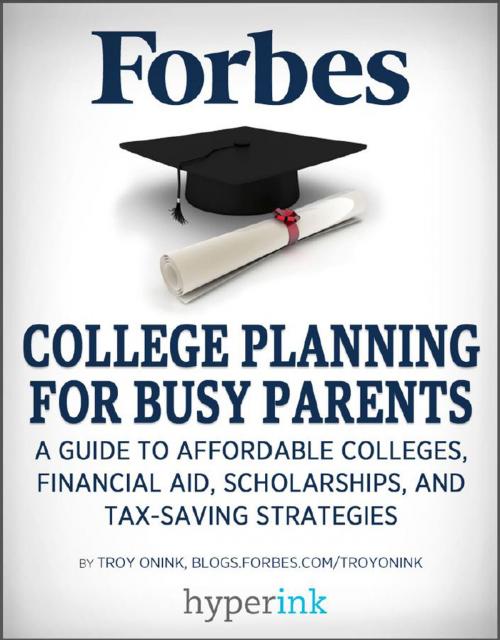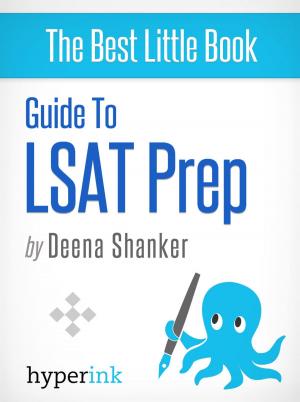College Planning for Busy Parents: A Guide to Affordable Colleges, Financial Aid, Scholarships, and Tax-Saving Strategies
Nonfiction, Reference & Language, Reference, Guides & Handbooks, Business & Finance| Author: | Troy Onink | ISBN: | 9781614645320 |
| Publisher: | Hyperink | Publication: | August 6, 2012 |
| Imprint: | Hyperink | Language: | English |
| Author: | Troy Onink |
| ISBN: | 9781614645320 |
| Publisher: | Hyperink |
| Publication: | August 6, 2012 |
| Imprint: | Hyperink |
| Language: | English |
ABOUT THE BOOK
The most important thing to remember about my College Crossroads blog at Forbes.com is that my posts are different than what is typically written elsewhere on college planning, and that is because I bring a rather unique perspective to this specialized area. For almost twenty years I have specialized in helping families determine their best strategy to pay for college, and doing so requires a rare knowledge of how four key areas must come together to form a family's best strategy: College selection, financial aid, tax aid, and personal resources.
College admissions and financial aid professionals know their respective areas well, as do tax and financial advisors, but virtually none have a solid grasp of the areas outside their own, let alone how each area impacts the others for college planning purposes. That's where I come in. I have spent twenty years working with families and collaborating with these other professionals, making it my business to make the connections, gain the insights, and innovate ways to help families determine their best strategy to pay for college and enjoy a Real Life Retirement.
My blog posts are less about what the latest studies or headlines say, and more about what you really need to know. I am about answers, not more and more information. If I think you need to know about a single topic in more detail, I go to the experts on those topics and interview them in the context of the four key areas: College selection, financial aid, tax aid, and the use of your personal resources to pay your share of the cost, with or without financial aid. It keeps the focus on strategy and simplicity; the best strategy to pay for the colleges that are the best fit. Finally, unless a student is independently wealthy, getting a college degree is ultimately about getting a job. The blog and this book cover that too.
ABOUT THE AUTHOR
Troy Onink is a nationally-known authority on college planning. Troy has specialized in college planning for twenty years, during which he pioneered this specialized field by integrating the areas of financial planning, investing, college admissions, financial aid, tax strategies, and wealth management, for the purpose of determining each family's best strategy to pay for college. Troy views college as a tollbooth on the road to retirement, and by having a strategy families choose the right exits, pay the toll as wisely as possible, and stay up to speed for retirement.
Troy is CEO of Stratagee.com, the firm he co-founded to create innovative college planning software to help families identify where their children may be able to get in to college and get aid, and determine the family's best strategy to pay for the colleges that are the best fit for their children.
EXCERPT FROM THE BOOK
Why College Co-Op Programs Totally Rock
"I made $46,000 working as a Co-Op student for a great company while I was getting my college degree from a well-known university, and now the company that I did my Co-Op with wants to hire me." This isn't too good to be true. The truth is that College Co-Op programs totally rock, and I could have gotten that quote from thousands of Co-Op students nationwide.
There are several reasons why college Co-Op programs rock.
Added Work Experience and Job Offers
Think about this: One student goes to college, tries to find a job in the summer just to help with expenses, and then graduates on time with good grades but no work experience, and a boat load of student loans. Another student goes to college for the first half of the year, then goes to work at a company that is part of her university's Co-Op program, gains six months of work experience for which she is paid $11,000 - $18,000, then goes back to campus to learn in the classroom, repeating this cycle until she graduates with both a degree and meaningful work experience.
Buy the book to read more!
ABOUT THE BOOK
The most important thing to remember about my College Crossroads blog at Forbes.com is that my posts are different than what is typically written elsewhere on college planning, and that is because I bring a rather unique perspective to this specialized area. For almost twenty years I have specialized in helping families determine their best strategy to pay for college, and doing so requires a rare knowledge of how four key areas must come together to form a family's best strategy: College selection, financial aid, tax aid, and personal resources.
College admissions and financial aid professionals know their respective areas well, as do tax and financial advisors, but virtually none have a solid grasp of the areas outside their own, let alone how each area impacts the others for college planning purposes. That's where I come in. I have spent twenty years working with families and collaborating with these other professionals, making it my business to make the connections, gain the insights, and innovate ways to help families determine their best strategy to pay for college and enjoy a Real Life Retirement.
My blog posts are less about what the latest studies or headlines say, and more about what you really need to know. I am about answers, not more and more information. If I think you need to know about a single topic in more detail, I go to the experts on those topics and interview them in the context of the four key areas: College selection, financial aid, tax aid, and the use of your personal resources to pay your share of the cost, with or without financial aid. It keeps the focus on strategy and simplicity; the best strategy to pay for the colleges that are the best fit. Finally, unless a student is independently wealthy, getting a college degree is ultimately about getting a job. The blog and this book cover that too.
ABOUT THE AUTHOR
Troy Onink is a nationally-known authority on college planning. Troy has specialized in college planning for twenty years, during which he pioneered this specialized field by integrating the areas of financial planning, investing, college admissions, financial aid, tax strategies, and wealth management, for the purpose of determining each family's best strategy to pay for college. Troy views college as a tollbooth on the road to retirement, and by having a strategy families choose the right exits, pay the toll as wisely as possible, and stay up to speed for retirement.
Troy is CEO of Stratagee.com, the firm he co-founded to create innovative college planning software to help families identify where their children may be able to get in to college and get aid, and determine the family's best strategy to pay for the colleges that are the best fit for their children.
EXCERPT FROM THE BOOK
Why College Co-Op Programs Totally Rock
"I made $46,000 working as a Co-Op student for a great company while I was getting my college degree from a well-known university, and now the company that I did my Co-Op with wants to hire me." This isn't too good to be true. The truth is that College Co-Op programs totally rock, and I could have gotten that quote from thousands of Co-Op students nationwide.
There are several reasons why college Co-Op programs rock.
Added Work Experience and Job Offers
Think about this: One student goes to college, tries to find a job in the summer just to help with expenses, and then graduates on time with good grades but no work experience, and a boat load of student loans. Another student goes to college for the first half of the year, then goes to work at a company that is part of her university's Co-Op program, gains six months of work experience for which she is paid $11,000 - $18,000, then goes back to campus to learn in the classroom, repeating this cycle until she graduates with both a degree and meaningful work experience.
Buy the book to read more!















